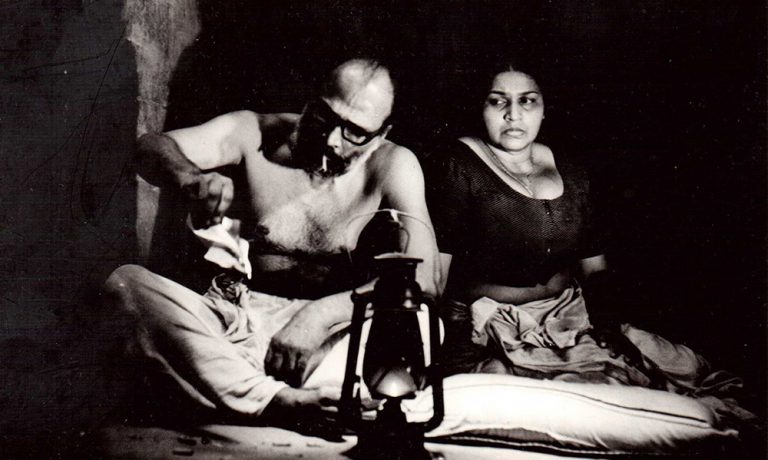Festivals: New York, Washington DC, London, Locarno, Brussels, Antwerp, Munich, Fribourg, Manosque, Paris, Nantes, La Rochelle, Pesaro, Helsinki, Ljubljana, Alexandria, Hong Kong and New Delhi among others.
Awards: International Film Critics Prize (FIPRESCI) for the Best Film – New Delhi,
National Awards for Best Direction, Best Screenplay, Best Audiography and Best Malayalam Film.
Kerala State Awards for the Best Film, Best Direction, Best Cinemato-graphy, Best Audiography and Best Editing.
Synopsis
 A prospering tile factory is changing life and attitudes in a small town in Kerala. Mechanised production has brought industrial labour into headlong collision with the management. A prolonged strike results, with neither side yielding,
A prospering tile factory is changing life and attitudes in a small town in Kerala. Mechanised production has brought industrial labour into headlong collision with the management. A prolonged strike results, with neither side yielding,
Sreedharan, a dedicated revolutionary and worker of the Communist Party, is the trade union leader at the factory. He has a charismatic hold on the town’s labourers.
Sreedharan is found badly beaten up one night by an old farmer. He begins to live in his house; the farmer’s widowed daughter becomes his mistress.
The proprietor of the factory is killed—and Sreedharan is prime suspect. The police embark on a fierce round-up. Sreedharan and his comrades go underground.
Years pass. Sreedharan is believed to be dead. His comrades have returned in the light of a more liberal political environment.
 The party which Sreedharan so selflessly supported and served is no longer united in its ideology or its leadership—Its rank and file is split. The binding factor between them is the memory of Sreedharan.
The party which Sreedharan so selflessly supported and served is no longer united in its ideology or its leadership—Its rank and file is split. The binding factor between them is the memory of Sreedharan.As if in answer to their prayers and wishes, Sreedharan suddenly returns. His family, his followers at once turn to him for ‘ succour and strength,
But Sreedharan proves to be a bitter disappointment. His presence now is an unsavoury one. All the same, the memory of his hallowed past has a hold on people. Rival factions vie with each other to use his name.
Sreedharan is found one day beaten to death under mysterious circumstances… He is instantly transformed into the hero he was in the old days.
Period and Background
In 1957 the Communist Party was voted into power in the State of Kerala, South India and it stayed the ruling Party for a short period. The year 1964 saw the Party split in two, the Communist Party of India (CPI) and the CPI (Marxist). Later, many extremist splinter groups emerged.
The first part of the film is set in the decade ending in 1955. The second part begins from 1965.
The Director’s Statement
MY previous film, Elippathayam dealt with an individual trapped in a situation which was mostly the making of a society in transition. In Mukhamukham, the society itself is caught in a crisis.
There lives an idealist, . a revolutionary—not necessarily political—in every individual. But in the course of time, as a matter of common experience, this spirit either dies out or becomes dormant. The idea of this film was born out of my desire to search for this spirit. Hence the basically investigative character of its structure.
Driven by a sincere and deep-felt desire to find the answer to their questions, people conjure up the man of the image from the past and wait listlessly for things to happen.
The man of the image returns but he turns out to be a bitter disappointment. He acts and behaves like themselves— withdrawn, indifferent, evasive, confused and defeated. He cannot even inspire them anymore.
He is in fact a projection of their own selves—a very inconvenient, embarrassing and menacing revelation. Naturally they do not want to accept this, for it is pointing the finger at themselves.
Soon the status quo is maintained by destroying the real and resurrecting the blemishless, venerable image of their ideal.
Filmmakers and Critics Say
Iqbal Masud, Indian Express
Derek Malcolm, The Guardian.
Credits
- Story, Script & Direction: Adoor Gopalakrishnan
- Production Company: General Pictures
- Producer: Ravi
- Photography: Ravi Varma
- Audiography: Devadas
- Editing: M. Mani
- Music: M.B.Srinivasan
- Art: Sivan
- Chief Assistant: Meera Sahib
- Production Executive: Rajasekharan Nair
- Stills : Mohan & Madhu
- Country India
- Language Malayalam
- Year of production 1984
- Format: 35mm Colour
- Duration 107 Minutes
- Sub-titles English & French
Cast and Characters
- P. Ganga (Sreedharan),
- B.K. Nair (old farmer)
- Kaviyoor Ponnamma (Savitri, his daughter),
- Krishna Kumar (Savitri’s son),
- Karamana, Thilakan (trade union leaders),
- Viswanathan (Sudhakaran Jr)
- Ashokan (Sudhakaran Sr),
- Lalita (a Party worker),
- Vembayam (tea-shop owner),
- Krishnan Kutty Nair (beedi-maker),
- Alummoodan (factory proprietor’s aide),
- John Samuel, Azeez, Shanmukham Pillai, Somasekharan Nair, Mavelikara etc…(Party workers)
More Stills: |
|||||
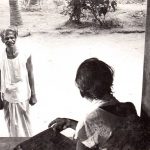 |
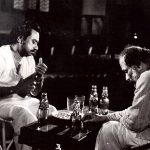 |
 |
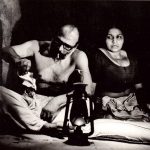 |
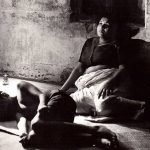 |
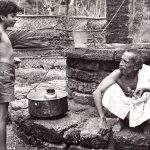 |
Working Stills: |
||
 |
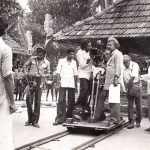 |
|

